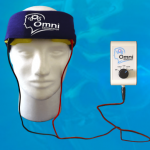Medical and legal experts are calling for a regulatory response to the booming business in cognitive-enhancing ‘brain stimulator’ devices.
The rapidly expanding consumer market for transcranial direct current stimulation (tDCS) devices poses a safety risk particular when such devices are used unsupervised by vulnerable groups including children and people with psychiatric disorders, they write in the MJA.
 The devices, which can be bought for as little as $30 on eBay, apply a small electrical current of 1-2mA via electrodes to a person’s scalp, sufficient to increase the neuronal readiness to fire.
The devices, which can be bought for as little as $30 on eBay, apply a small electrical current of 1-2mA via electrodes to a person’s scalp, sufficient to increase the neuronal readiness to fire.
Neuromodulation is promoted as a means of improving cognitive skills such as memory, attention, gaming and mathematical skills but also for a variety of ailments including ADHD and mood disorders, according to Professor Anne-Maree Farrell, Chair of Health Law and Society at La Trobe University in Melbourne.
While the devices may be safe when used in a clinical setting, their unsupervised use by consumers may lead to harm if they are used at high settings, for a long duration and for extended periods of time, says Professor Farrell and colleagues fro the Monash Institute of Cognitive and Clinical Sciences.
As well as adverse effects such as itching and burning from electrode use, inappropriate use of the devices may exacerbate mood disorders and lead to anger and impaired cognition, they write.
Overuse of tDCS is of particular concern in children and adolescents, who may be more prone to neurodevelopmental adverse effects.
“The prolonged and unsupervised use of tDCS may also have unexpected effects on people with diagnosed or subsyndromal psychiatric disorders (eg, psychosis and depression),” they add.
Ethical concerns about tDCS include the lack of scientific evidence and also social coercion for their use in children by worried well parents who want their children to keep up with their peers.
The authors say consumer use of tDCS is not currently restricted, and they call for regulatory oversight to be implemented in a more proactive way by the TGA.
The tDCS devices could be regulated under the Therapeutic Goods Act if there is a broad interpretation of the definition of a medical device, they suggest.
They point to the examples of EU medical device regulations and the US FDA as examples of regulators taking a more proactive approach to oversight of tDCS.
“Although there is widespread marketing and commercial sales of consumer tDCS devices in Australia, there is currently no national regulatory oversight of their safety or effectiveness by the TGA,” they note.
“A proactive regulatory approach is both timely and appropriate. Recent EU developments offer a way forward in the event that national regulatory reform is considered necessary to ensure that these devices are subject to national medical device regulation,” they conclude.